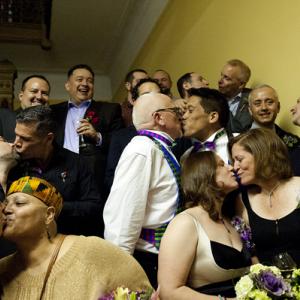Dr. Jay Michaelson is an author, activist, and academic. He is currently a Visiting Scholar at Brown University and Director of the LGBT Global Rights Initiative at the Democracy Council. Via RNS.
Posts By This Author
Pope Francis’ Environmental Encyclical Is Even More Radical Than It Appears

Universe filled with stars, nebula, and galaxy. Photo via suns07butterfly / Shutterstock.com
Whatever impact “Laudato Si'” has in the political world remains to be seen. But that the pope is here embracing a nature-based mysticism, a highly adumbrated anthropocentrism, and a radical “integral ecology” places the encyclical alongside the best of radical, progressive religious environmentalism — and far outside what even mainline Protestant denominations have affirmed heretofore.
“Laudato Si'” may turn out to be politically influential. It is already theologically revolutionary.
Why North Carolina’s Unprecedented Exemption Is Wrong for America
This week, North Carolina’s legislature overrode its Republican governor’s veto to allow magistrates and clerks to refuse to perform same-sex marriages.
This unprecedented move — never before have state employees been allowed to simply stop doing their jobs — comes at a time of profound debate regarding same-sex marriage. It is exactly the wrong move.
We’re Meditating All Wrong, Says ‘Buddha from Brooklyn’
Lama Surya Das, the “Buddha from Brooklyn,” is one of the handful of Westerners who have been teaching meditation for decades. And yet, he says we’re doing it wrong.
“So many people seem to be moving narcissistically — conditioned by our culture, doubtless — into self-centered happiness-seeking and quietism, not to mention the use of mindfulness for mere effectiveness,” he said. True meditation, he said, generates wisdom and compassion, which may be very disquieting, at least in the short term.
Examining Anti-Semitism on U.S. College Campuses
Is anti-Semitism rising on U.S. college campuses?
According to most statistics, yes — but the phenomenon is far more complicated than it first appears, primarily because everyone oversimplifies it.
The data, and the anecdotes, are shocking. In a study conducted in spring 2014 (notably, before the Israel/Gaza conflagrations of last summer), 54 percent of Jewish students said they had personally witnessed or experienced an anti-Semitic incident. And in just the last two months, swastikas have been painted on walls at the University of California’s Berkeley and Davis campuses and at New York’s John Jay College.
But what do these incidents mean? There is a great reluctance even to engage with the question.
Among liberals, even though it is obvious that many of these incidents are motivated in part by Israel/Palestine politics, no one wants to give hatred a pass. A swastika is a swastika, graffiti is graffiti, and collective guilt — in this case, blaming all Jews for specific actions of Israel — is always wrong.
Conservatives, meanwhile, routinely conflate anti-Israel and anti-Semitic speech. The far-right David Horowitz Freedom Center, for example, recently released its list of the American college campuses with the “worst anti-Semitic activity.” But many of those activities were protests of Israel. Extreme, perhaps, and unfair; but not really the same as anti-Semitism.
The fact is, the borders of anti-Semitism are permeable. Human speech does not divide neatly into “hate speech” and “political speech.” Thus, if we are to avoid the over-generalizations, we must be more rigorous in our definitions of the phenomenon or we risk diluting the evil of anti-Semitism itself.
In fact, a swastika is not just a swastika. Consider an anti-Israel protest that depicts an Israeli flag with a swastika on it. Offensive, to be sure. But what is it saying? It’s saying that Nazis are bad, and that the Israeli government is Nazi-like.
Now consider an anti-Semitic incident in which someone sprays a swastika on a synagogue door. Also grossly offensive, to say the least. But it is saying something very different. It is saying that Nazis are good, and we should finish the work they started.
The same symbol thus has two nearly opposite meanings.
Obama Compares ISIS to Crusades, Inquisition, Slavery, and Jim Crow. Was He Right?
The conservative Twitterverse is all riled up because at Feb. 5 National Prayer Breakfast (an event founded and run by the secretive Christian organization known as The Fellowship), President Obama said that Christians, as well as Muslims, have at times committed atrocities. His words:
“Humanity has been grappling with these questions throughout human history. And lest we get on our high horse and think this is unique to some other place, remember that during the Crusades and the Inquisition, people committed terrible deeds in the name of Christ. In our home country, slavery and Jim Crow all too often was justified in the name of Christ.”
This would seem to be Religious History 101, but it was nonetheless met with shock and awe.
“Hey, American Christians–Obama just threw you under the bus in order to defend Islam,” wrote shock jock Michael Graham. Rep. Marlin Stutzman, R-Ind., called the comments “dangerously irresponsible.” The Catholic League’s Bill Donohue said: “Obama’s ignorance is astounding and his comparison is pernicious. The Crusades were a defensive Christian reaction against Muslim madmen of the Middle Ages.”
More thoughtfully, Russell Moore, president of the Southern Baptist Ethics and Religious Liberty Commission, called Obama’s comments about Christianity “an unfortunate attempt at a wrongheaded moral comparison. … The evil actions that he mentioned were clearly outside the moral parameters of Christianity itself and were met with overwhelming moral opposition from Christians.”
Really?



